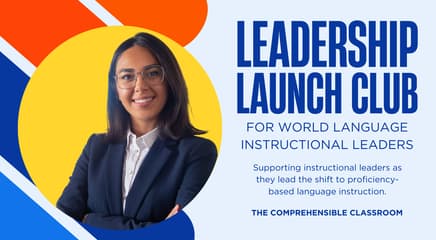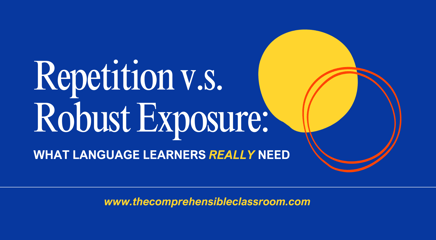In the most recent issue of The Language Educator, Sandy Cutshall published an article entitled "Groundbreaking Study from ACTFL Measures Listening and Reading--Expands Understanding of Interpretive Skills" that provides a high level of support for teachers that focus on providing their students with extensive amounts of input that is comprehensible.
 Cutshall, S. (2015) . Groundbreaking Study from ACTFL Measures Listening and Reading--Expands Understanding of Interpretive Skills. The Language Educator, 10 (3), 10-12.
Cutshall, S. (2015) . Groundbreaking Study from ACTFL Measures Listening and Reading--Expands Understanding of Interpretive Skills. The Language Educator, 10 (3), 10-12.
Interpretation is communicative.
This article describes findings from a study that ACTFL conducted in the 2014-2015 school year. This study aimed to understand students' acquisition of language in the areas of listening and reading (interpretive language skills). This is VERY exciting, because until recently ACTFL has had the reputation of being 'all about speaking'. While many language teachers have been trained to use 'communicative' methods, and listening and reading are necessary skills in communication, a 'communicative class' is commonly understood to be a class in which the teacher's objective is to "GET THEM TALKING!" and keep them talking. This focus on working in the productive mode as soon and as often as possible is a totally different approach than what you would find in Acquisition-focused classrooms, in which the objective is to "GET THEM INTERPRETING!". If we can get students to interpret extensive amounts of language, the output (speech and writing) will naturally follow without having to demand it from students.
 Click on the image to purchase this poster from Grant's Products page
Click on the image to purchase this poster from Grant's Products page
Grant Boulanger ("The Great Boulanger", as I like to call him), shared a handwritten poster from his classroom that has 'gone viral'--so much so that he made a fancy pants, typed, colorized poster out of it that you can purchase here. Research in the area of Second Language Acquisition overhwhelmingly supports the idea that first we learn to listen. First we learn to interpret; then we learn to produce.
Here are some quotes from The Language Educator article that got me excited:
Listening and reading are acquired faster than speaking
"Among preliminary findings being reported[,] listening and reading are acquired at a faster rate than speaking skills and therefore Advanced levels of listening and reading proficiency appear to be realistic goals for Category I languages at graduation, even if the students have not yet reached that level in oral proficiency"
This study shows that students acquire the interpretive abilities faster than the productive abilities, and we must not forget that those skills can only be acquired if students are given the opportunity to acquire them.
What does that tell me? By golly, we'd better be giving our students an opportunity to use those listening and reading skills! We need to spend a good chunk of that 90 percent PLUS of our class time in the target language allowing our students to HEAR it and READ it--not inputing language for 10 percent of the time and then letting them loose for the remaining 80 percent! I spent my first year as a full-time public school teacher in this way, and the results were pathetic. My students were very comfortable speaking, but their speech was terrible! And their ability to read and listen to any significant text? Forget about it! We didn't do that in class, and so they couldn't do it on their own.
A focus on interpretation is good for our field
Reading, reading, reading!! If you aren't convinced, then click over here to Amazon and purchase Krashen's text, "The Power of Reading". Our students must be reading extensively in the target language.
"A greater focus on interpretive skills is an important advancement in the language profession...Many educators and researches have a renewed understanding of reading as a highly effective and efficient way of accumulating knowledge..."
How exciting to see this article affirm that our focus on interpretive skills is valued and supported by our professional organization!
One important thing I would point out is that when I am aiming for interpretation, I am aiming for understandings texts at a deep level– all texts! This applies even to authentic resources. "Best practice" in a comprehension-based language class is preparing students to read and understand authentic texts (in the long-term) by using texts written for language learners in novice classes (these texts are not authentic definition, but authentic to the context of the classroom... click here for more about that). A
By using texts that are written for language learners every day in my novice classes as scaffolding and allowing my students limited opportunities to strategically interact with authentic resources, my kiddos are prepared to comprehend authentic texts early on because they have practiced the skill of reading. Real reading--not task-based reading. Just reading.
Listening comprehension is scaffolding for interpersonal communication
 Cutshall, S. (2015) . Groundbreaking Study from ACTFL Measures Listening and Reading--Expands Understanding of Interpretive Skills. The Language Educator, 10 (3), 10-12.
Cutshall, S. (2015) . Groundbreaking Study from ACTFL Measures Listening and Reading--Expands Understanding of Interpretive Skills. The Language Educator, 10 (3), 10-12.
"[Erwin Tschirner, the study's director] also notes the importance of the role of listening comprehension "not as an indicator, but as scaffolding" for developing interpersonal speaking. "Right now we know that most language students, even at the postsecondary level, do not go beyond the Intermediate-Mid level in speaking. One factor may be not giving enough time to teach listening comprehension, a skill that comes first" [emphasis mine]"
Do you hear the angels singing? HALLELUJAH! This is so exciting to me!! ACTFL's research shows that listening comprehension precedes interpersonal speaking ability. So why on earth would we force our students into conversation to 'solidify the language' when they haven't even learned to understand what the other person is saying?
First we learn to listen!!!
(It's important to note that this post is about what got me excited about the article, and it excludes much important information about the study that would be important for you to know! For example, the study showed that listening comprehension of French develops more slowly than reading comprehension in French, which is different than the other Category I languages. So perhaps in French, "First we learn to read!" Perhaps.)
My other takeaway from the article is this:
First we must learn to listen!
The most obvious lesson from the article was that "First we learn to listen [and understand a language]". The less obvious but possibly more important lesson is that "First we must learn to listen to each other". This summer, NTPRS coincided with LILL (Leadership Initiative for Language Learning), and attendees at both conferences were tweeting their tails off! There were a few times when the tweeting got a little heated (not a lot...just a little) because the speakers at the two conferences did not agree on all aspects of language education. And there was a little bit of "us" and "them" from both conferences, but mostly there were a lot of people at both conferences saying that the "us" and the "them" is holding back our profession! I loved reading tweets from LILL and NTPRS at the same time because WE agree on so much! WE are moving in the same direction. WE want our students to acquire language. WE have read the research, and WE have not all arrived at the same conclusions. Who cares?? My husband and I don't agree on everything, but we're still here! We are still a family and we stand together. When we disagree, what do WE do? WE listen! We must listen! I listen to him; he listens to me. Sometimes we still don't come into agreement...but sometimes we do. And even when we don't agree, we can move forward together because we have listened.
I'm still a baby language teacher. (Actually, I'm not a language teacher at all right now, I'm a full-time mom.) I started teaching in 2006; not even 10 years ago. I didn't 'plug in' until 2009, so I am blissfully unaware of why bad blood runs between "ACTFL types" and "TCI types". But I don't live in a cave, and so I know that there are some hurt people. As the saying goes, "hurt people hurt people", and unfortunately I have witnessed a few too many hurtful interactions between "us" and "them".
Friends, first we must learn to listen! If WE stop talking and stop assuming what the other party is thinking, WE will see that WE agree on so much! Look at this study, for crying out loud! WE are both trying to learn and improve and do better by our students. But we must learn to listen in order to make those connections.
My challenge to you and to myself is to go out and find something from "THEM" (whoever the "them" is for you) and consider it. You might not agree, but you won't be worse off for the consideration. And, like me reading The Language Educator today, you might just find that you and "them" agree a little more than you thought!
Let's learn to listen.




